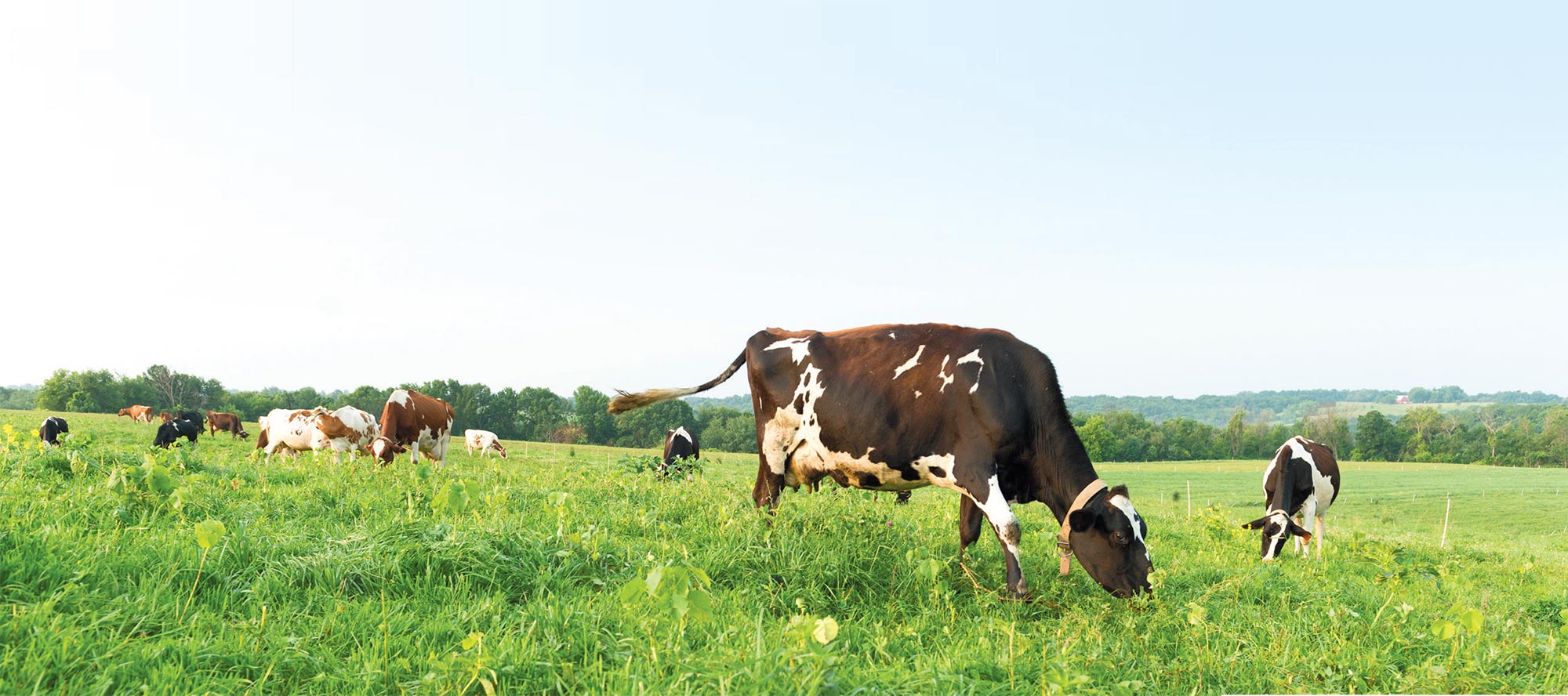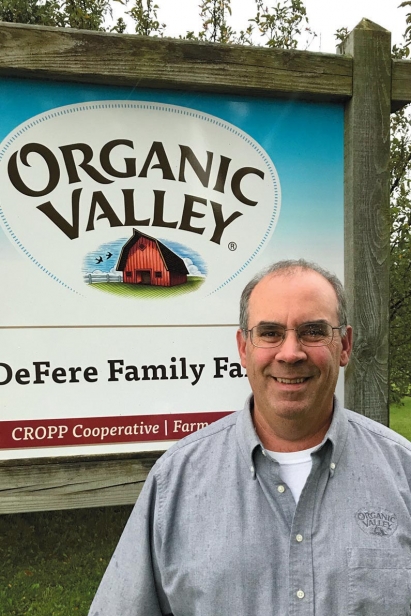Contributing to a Successful CROPP
KIEHNAU EXCITED WITH ROLE AT ORGANIC VALLEY
While the future of farming can be the subject of debate, there is little doubt that one segment of it has enjoyed significant growth. It’s reflected by the success of a cooperative that 30 years ago sprang from the organic movement.
Within that movement is the story of one farmer who literally bet the farm on the future of the CROPP Cooperative. It is widely known today under its marketing brand name, Organic Valley.
Kevin Kiehnau’s story gives an individual perspective to how CROPP grew to become the largest organic farmer-owned cooperative in North America. It was based on the premise that the venture would give family farmers a way to stay on the land they loved and give consumers better food produced without dangerous chemicals.
Kiehnau’s background in farming isn’t all that different from other farmers in Wisconsin.
“My dad’s family came from Germany and settled in the Milwaukee area,” he said. “There is a Kiehnau Avenue in Milwaukee where my great-grandfather’s farm was. My grandfather moved to Door County around 1917, and my dad bought the farm I was on in 1946 after returning from World War II.”
It’s situated in Egg Harbor on another road with the Kiehnau name. Kevin took it over in 1979 after graduating from high school.
“I certified organic in 1994 and started shipping milk to CROPP,” he explained. “I was the 54th member of the cooperative. My neighbor Gary Mosgaller was the 53rd.”
That’s significant because CROPP currently has 2,000 farmer members spread across 36 states.
“Our growth has been exponential as more and more farmers have heard from their neighbors and friends of the benefits of going organic and joining CROPP,” said Travis Forgues, vice president of farmer affairs for the cooperative. “Our mission is to save more family farms through organic agriculture. So we grow because we stay true to our mission, while meeting increasing consumer demand for organic dairy, produce, eggs and meat.”
Everyone has their own story as to why they switched to organic, and for Kiehnau it came down to family. Originally, Kiehnau said he was like so many other conventional farmers who saw farming as a means to pay the bills and not so much as to what was being put into the ground.
He attended a local presentation in the Wisconsin Sustainable Agricultural Demonstration Program that, Kiehnau points out, ironically was funded by money that came from a federal oil over-charge allotment to the state.
“It got me thinking in the direction of organic farming. Sustainable ag was part of a stepping stone that led to grazing cows and reducing chemical use,” he said.
But there was an even more personal reason for the change.
“I put leftover pesticides in the basement after the season so it wouldn’t freeze,” he said. “Then we had our first daughter, and I realized I couldn’t do that any more because she could get into it. You’re basically putting poison on food, and it’s not the fault of the individual farmer. If you pick up a farm magazine and look at the stories and if you don’t do what they tell you to do, you’re not a good farmer.”
But the move to organic was risky since there weren’t a whole lot of choices to take your milk.
“In 1995, CROPP was the only organized organic milk in the state,” said Kiehnau. “The only other option was to start your own market. Gary (Mosgaller) and I were headed down that path until CROPP was able to pick us up. CROPP is very different from most co-ops in that members truly have a say in what is happening and a true part in governing. At the time we started with CROPP, the co-op was so new and so small we weren’t sure what to expect, but it didn’t take long to see that this co-op was different.”
Just a decade earlier the effects of the farm economic crisis had stirred interest in southwestern Wisconsin. Centered in Vernon County in the state’s Coulee Region, a group of farmers began to re-examine the organic practices first professed in the book Pay Dirt by Jerome Rodale. It stressed the dangers of pesticide spraying and promoted an alternative to chemicals built on the principles of Sir Albert Howard of Great Britain.
Except for rural communes and anti-establishment youth of the 1960s, Howard’s practices gradually gave way to synthetics and chemicals to boost crop production, kill insects, fatten cattle, treat livestock disease and increase dairy production.
The book Roots, published by CROPP to commemorate its 25th anniversary, points out that despite all the changes that came to farming, there remained some stubborn organic farmers who had stuck to the time-honored practices learned from their parents and grandparents.
“I’m so far behind, now I’m ahead,” said one such farmer, reflecting on the return to organic practices. But it’s been a slow process.
“We got very little support from conventional producers,” said Kiehnau. “Many thought we were crazy, but when they saw that we didn’t disappear and were actually doing well things started to change.
“It isn’t easy to change eating habits or for producers to make a hard right turn,” he adds. “We’re actually back to the 1930s and 40s when there weren’t any pesticides or antibiotics. It’s just that technology has allowed us to resume those practices on a broader scale and make this type of farming profitable.”
The cooperative, armed with a strong marketing concept, helped to make it all happen.
CROPP (Coulee Region Organic Produce Pool) started with a group of seven farmers who began meeting in living rooms and kitchens in late 1987. They fashioned bylaws on the organic philosophy and system of production that mirror the natural laws of living organisms with emphasis on the interdependence of all life.
It has roots in how Wisconsin’s tobacco pools were run, with a board of directors comprised of organic farmers that is the final decision maker on major items. As CROPP grew and added new products, executive committees were created to represent them, its members elected by CROPP farmers.
George Siemon emerged from those initial meetings as the primary leader, initially taking a break from his farm “at least until his heifers were old enough to milk.”
A mix of people ranging from back-to-the-land folks in the alternative community to traditional farmers and even quite a few Amish attended the first meeting in Vernon County. More than 180 people showed up, a surprise to Siemon who admitted that he wasn’t sure if 15 people would show up. Initial fundraising at that meeting involved passing the hat and netted $128.87.
Six months later CROPP picked up its first load of organic milk that went to Torkelson’s Springdale Creamery in Readstown to make America’s first commercially certified organic cheese. By 2012 milk accounted for 90 percent of the cooperative’s annual revenues, amounting to $860 million. As CROPP grew, so did Kiehnau’s role in it.
He sold his dairy herd in July 2005 and started cash cropping and raising beef. In September of that year, he began working part time for CROPP.
“After a year I was offered a full-time position and took it. Better than two years later I was offered a management position overseeing Michigan, Indiana, Ohio, Kentucky and two-thirds of Wisconsin,” said Kiehnau, who is now the East Central Division Manager for CROPP. “Today I have a staff covering the area and working with just under 600 of our member owners.”
After Tom Lutsey bought Kiehnau’s farm in Door County, Kiehnau assisted Lutsey in helping Waseda Farms get started by helping train their staff in organic farming techniques and treatments. He continues to help them as an advisor.
Kiehnau said that while CROPP continues to grow, it only does so to the benefit of its members.
“We practice supply management,” he explained. “We only take the milk we can sell, which keeps our prices stable and protects our current members only.”
“We’re a social experiment disguised as a business,” is how Siemon described the CROPP initiative.
The business part is known to the consumer as Organic Valley, a name that first appeared on the grocery shelves in April 1990. A study committee wrestled over a choice between Organic Valley and Family of Farms. It settled on Organic Valley with Family of Farms inserted into an oval with the now-familiar barn and pastoral scene.
Organic Prairie was added in 2010 and represents the cooperative’s successful organic meat program, which needed two tries to launch.
Forgues sees CROPP continuing to grow as long as there is a fidelity to the mission, consumer demand increases and farmers want to join the company.
“There does seem to be a movement towards greater awareness of and value for quality foods and healthier habits,” he said. “The younger generations that are growing in buying power are essentially voting with their dollar and again and again are choosing to support companies that produce quality foods.
“Farmers come to organic for many reasons,” he adds. “We find that many times they are enticed by the good pay. Our farmers, for example, are currently paid about $19 above the current conventional pay price per hundredweight of milk. We find they stay because they see amazing improvements in the health of their soil, crops, water and animals.” Kevin Kiehnau is one such farmer.
“It’s freaky fascinating,” he admits. “I’m so lucky. It just seemed to happen.”
Kind of organically, you might say.






